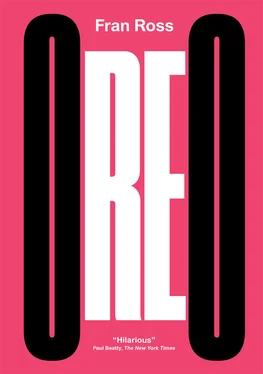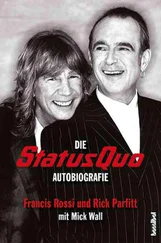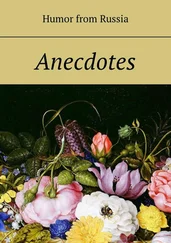An important incident in the legend of Oreo
Louise’s brother Herbert was a great traveler. On his return from Morocco or Afghanistan or Greece or Chile, he would stop by to see his sister, check on James’s immobilization, and give Oreo and Jimmie C. the presents he had brought with him from foreign shores. He was a huge man, a 1 on the color scale. He had a scar from the corner of his lip to the top of his right ear, a memento of an incident of his childhood outside the village of Gladstone, when, with a callow slip of the tongue, he called two playmates of somewhat higher color-scale value black sons of bitches. Whenever he came to the house, he would go directly to the large mirror in the dining room, pull a flask from his hip pocket, drink deeply, growl, wipe his mouth with satisfaction, and say, “I’m Big Nigger Butler.” It was strange to hear this from a man for whom Hermann Goring could serve as Doppelgänger .
Herbert would fling off his coat and take out a little black book clotted with columns of three-digit numbers, written in heavy pencil. Under or over each digit in a three-figure unit was a dot or a dash or a circle or a slanted line or a cross. Herbert took Oreo on his knee and explained to her what these mysterious markings meant. It was an elaborate system for playing the numbers, a passion he shared with his sister Louise. His diacritical marks showed him which numbers had come out, when, their pattern of recurrence (did 561 prefer to come out in December, for example?), their correlation with world events (did numbers starting with 8 always presage the fall of a South American government, for instance?), and so on through a warren of statistical complexities that only Herbert could keep track of — Herbert who could correctly multiply any figure up to five digits by any other figure up to five digits in his head. But there was one difference between Herbert and Louise. Herbert had never hit a number. Oh, he had come close — once. He had played 782 straight on the day that Louise played 782 in the box and thereby hit for seven hundred dollars when 827 came out. Other than that, he rarely had even one digit in common with the number that hit. But he kept showing Oreo his book, telling her that one of these days, when she was old enough, he would have her trace his markings in ink. He secretly believed that his niece’s palimpsest of his numerical adventures would magically change his luck. His perverse delay (for Oreo had had her eraser and ballpoint at the ready for years) was a good example of herculean self-tantalization.
On one visit, Herbert had just returned from Africa. He had flung off his coat — made of the skin of a lion he had killed in a Nairobi pet shop — and had gone to his accustomed spot in front of the mirror to do his Big Nigger Butler routine, when all of a sudden there was a commotion behind him. He did not turn around, for he could see what was happening in the mirror. He had tossed his lion coat on a chair directly behind him, its hood with the opened-jawed lion’s head nuzzling his back. Oreo, thinking that the skin covered a live lion, had jumped up on the table behind her uncle and was stalking the coat. She came up behind it slowly, her hands behind her. When she was close enough, she pulled her jump rope from behind her back, whipped it around the head and mane, and double-dutched the coat to death — or so she thought. Her uncle, watching all this in the mirror, was impressed with her bravery. “She sure got womb, that little mother,” he said. “I wouldn’t want to mess with her when she gets older. She is a ball buster and a half .” He told the entire neighborhood about the incident. So it was that the legend of Oreo began to grow before she had cut her second teeth.
An important letter
At about this time, Oreo received a letter from her mother that influenced her thinking a great deal. Helen’s letter had its usual quota of asides, such as her paranoia about white dentists: “Suppose your dentist is white and suppose he just happens to harbor an unconscious hatred of black people and suppose he is in a bad mood anyway when you come in. Might he not just happen to bear down on the old drill a little harder, go a little deeper than he needs to? I am just asking and don’t want you to be warped for life by this thought. Besides, you still have your perfect little milk teeth. But since I’m on dentists, I will tell you about Dr. Goodbody. Dr. Goodbody starts spraying Lavoris before you even make an appointment. His sprayer bears a striking resemblance to a flame thrower. But who can blame him for his finickyness, considering the effluvium, the untreated sewage, the ick that issues from some people’s mouths? But Dr. Goodbody has never realized that a patient who is going to a dentist is like a housewife who cleans up before the maid comes. Such goings on with water picks and dental floss and mouthwash and toothpaste — to say nothing of sandpaper!”
This digression brought Helen logically to the main topic of her letter: the oppression of women. “This is a subject I’ve given a lot of thought to, and I think I have the answer. I’ve tried to encompass in my theory all the sociological, mythological, religious, philosophical, muscular, economic, cultural, musical, physical, ethical, intellectual, metaphysical, anthropological, gynecological, historical, hormonal, environmental, judicial, legal, moral, ethnic, governmental, linguistic, psychological, schizophrenic, glottal, racial, poetic, dental [this was the logical link], artistic, military, and urinary considerations from prehistoric times to the present. I have been able to synthesize these considerations into one inescapable formulation: men can knock the shit out of women.”
Helen’s letter went on to point out the implications of her formulation for the theory of the so-called black matriarchs: it tore the theory all to hell. In a later day, Helen might have gone on to add (with a slip of the pen owing to hunger): “There’s no male chauvinist pork like a black male chauvinist pork.” Now she contented herself with pointing out how her own mother still deferred to her father even in his immobilization, keeping on the safe side in case he ever came out of it. As Louise often said, “He ain’ gon [pronounced, by Louise and others, as if it were a French word, never as “gone”] hab no scuse to box my jaws.”
Helen’s letter so impressed Oreo that it led her to do two things: adopt a motto and develop a system of self-defense. The motto was Nemo me impune lacessit —“No one attacks me with impunity.” “Ain’t no nigger gon tell me what to do. I’ll give him such a klop in the kishkas! ” she said, lapsing into the inflections of her white-skinned black grandmother and (through her mother) her dark-skinned white grandfather, as she often did under stress.
She called her system of self-defense the Way of the Interstitial Thrust, or WIT. WIT was based on an Oriental dedication to attacking the body’s soft, vulnerable spaces or, au fond , to making such spaces, or interstices, where previously none had existed; where, for example, a second before there had been an expanse of smooth, nonabraded skin and sturdy, unbroken bone. To this end, Oreo developed a series of moves that made other methods of self-defense — jiu-jitsu, karate, kung-fu, savate, judo, aikido, mikado, kikuyu, kendo, hondo, and shlong — obsolete by incorporating and improving upon their most effective aspects. With such awesome moves (or, as Oreo termed them, blōs ) as the hed-lok, shu-kik, i-pik, hed-brāc, i-bop ul-na-brāc, hed-blō, fut-strīk, han-krus, tum-blō, nek-brāc, bal-brāc, bak-strīk, but-kik , the size or musculature of the opponent was virtually academic. Whether he was big or small, fat or thin, well-built or spavined, Oreo could, when she was in a state of extreme concentration known as hwip-as , engage any opponent up to three times her size and weight and whip his natural ass.
Читать дальше












